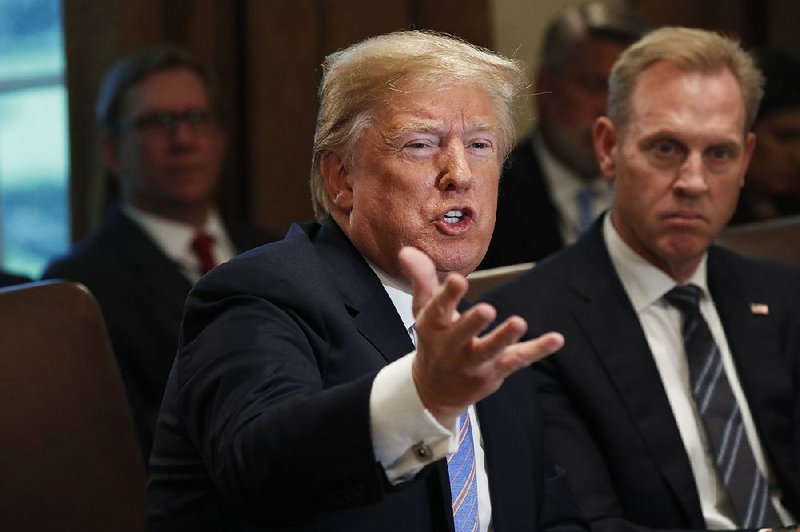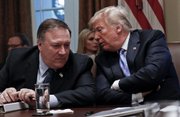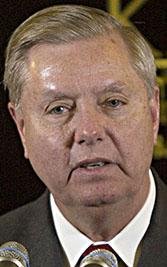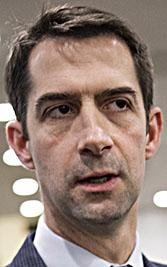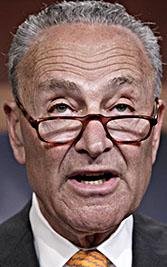President Donald Trump sparked a new uproar over his outreach toward Russian President Vladimir Putin on Wednesday by appearing to suggest that Russia is no longer targeting U.S. elections -- prompting the White House to assert hours later that Trump's words had been misconstrued.
At the start of a Cabinet meeting at the White House, a reporter asked, "Is Russia still targeting the U.S., Mr. President?"
"Thank you very much. No," Trump responded, shaking his head.
"No? You don't believe that to be the case?"
"No," Trump repeated before the questioner concluded.
Trump went on to say that no president has been tougher on Russia than he has. "I think President Putin knows that better than anybody, certainly a lot better than the media," Trump told reporters.
Several hours later, White House press secretary Sarah Huckabee Sanders said Trump was saying "no" to whether he would take further questions from reporters -- not to whether he believed Russia continued to target the U.S. with hostile actions.
"The president said, 'Thank you very much,' and was saying 'no' to answering questions," Sanders said. "The president and his administration are working very hard to make sure that Russia is unable to meddle as they have done in the past."
She added: "Certainly, like I just said, we believe that the threat still exists, which is why we are taking steps to prevent it."
Later Wednesday, in an interview with CBS News, Trump said he had told the Russian leader face to face to stay out of America's elections. In Helsinki at their summit Monday, he said, "I let him know we can't have this. We're not going to have it, and that's the way it's going to be."
Asked if he would hold Putin personally responsible for further election interference, he said, "I would, because he's in charge of the country."
Trump's statement from Wednesday's Cabinet meeting directly contradicts assertions from Dan Coats, the director of national intelligence, who has repeatedly said that Russia continues to try to interfere with American democracy.
"These actions are persistent, they are pervasive and they are meant to undermine America's democracy," Coats said in a speech Friday.
In his remarks, Coats said the intelligence community continues to see efforts by Russian actors to manipulate U.S. public opinion, including through the use of fake social media accounts. He also sounded the alarm about potential attacks on U.S. infrastructure or the financial system.
The Homeland Security Department and FBI "in coordination with international partners -- have detected Russian government actors targeting government and businesses in the energy, nuclear, water, aviation and critical manufacturing sectors," Coats said.
And on Monday, Coats renewed his warning of Russian interference.
"We have been clear in our assessments of Russian meddling in the 2016 election and their ongoing, pervasive efforts to undermine our democracy," he said.
FBI Director Christopher Wray on Wednesday stood behind the intelligence agencies' assessment.
"Russia continues to engage in foreign influence operations to this day," Wray said at the opening event of the Aspen Security Forum in Colorado.
"To me, it's a threat that we need to take very serious and respond to with fierce determination," he said.
The muddied waters have deepened critics' concerns that Trump is not taking seriously enough threats to the U.S. electoral system.
"Every one of our intelligence agencies -- those who are actually led by appointees of President Trump -- have said that not only did Russia engage actively in trying to undermine the elections of 2016 against Secretary Clinton and for now-President Trump, but that they are continuing to do so," Sen. Robert Menendez, D-N.J., said on MSNBC. "It is appalling that the president cannot seem to stand up to Vladimir Putin."
Sen. Lindsey Graham, R-S.C., said on Twitter that there is a "BIG discrepancy" between Trump's statement at Wednesday's Cabinet meeting and the warning by Coats.
"It's imperative we get to the bottom of what is going on so we can be prepared to protect ourselves in advance of the 2018 elections," Graham said. "My personal view: the Russians are at [it] again."
Sen. Richard Burr, R-N.C., the chairman of the Intelligence Committee, said he had no reason to doubt the warnings from intelligence agencies about November's midterm elections. "He ought to look at the intelligence," Burr said of Trump.
In an interview with the Arkansas Democrat-Gazette on Wednesday, Sen. Tom Cotton, R-Ark., said he believes Russia is targeting the U.S. elections this year.
"I have no doubt and that's based on a long pattern of Russian interference in western democracy in general and American democracy in particular," he said. "The CIA has since declassified documents from decades ago when Russia attempted to influence public opinion in America on things like intermediate range cruise missiles. This is simply what Russia does and it has done so for decades."
Asked whether he believes Trump understands that Russia is a threat to the U.S., Cotton said, "Yes. And under the Trump administration, our policy on Russia is much tougher than it's been in previous years. So, for instance, we have some of the toughest sanctions imposed on Russia; we have provided weapons to Ukraine that were requested but denied in [President Barack Obama's] administration; we have bombed his main Middle Eastern client twice, [Syrian President] Bashar al-Assad; we have convinced our NATO defense partners to spend more on our common defense; we are producing more American oil and gas, which is a direct hit on his main source of revenue, so in many ways our Russia policy is much tougher than it's been in recent years."
TRUMP ON TWITTER
Trump faced withering criticism earlier this week after he seemed to side with Putin over the U.S. intelligence community over Russian interference in the 2016 election.
On Tuesday, Trump sought to contain the damage by delivering a statement in which he said he accepts the U.S. intelligence community's assessment that Russia interfered in the 2016 election, but added that there "could be other people also."
In Tuesday's remarks, Trump said he had misspoken when he said of the culprit that interfered, "I don't see any reason why it would be" Russia.
Trump asserted that he had misspoken by saying "would" instead of "wouldn't."
"The sentence should have been, 'I don't see any reason why it wouldn't be Russia.' Sort of a double negative," Trump told reporters.
After his remarks at Wednesday's Cabinet meeting, Senate Minority Leader Charles Schumer, D-N.Y., suggested that Trump needed to do another round of damage control.
"Mr. President. Walk this back too," Schumer wrote on Twitter.
Other Democrats mocked Trump and suggested something nefarious was behind his statement.
"What world is Trump living in?" Sen. Bernie Sanders, I-Vt., wrote on Twitter. "Does he not understand what's going on? Is he being blackmailed because the Russians have compromising information on him? Or is he sympathetic to Putin's style of authoritarianism?"
Members of Congress have been working on legislation aimed at deterring future interference in U.S. elections.
Sens. Marco Rubio, R-Fla., and Chris Van Hollen, D-Md., introduced bipartisan legislation in January that would mandate sanctions and other punishments for any foreign actor that is found to have attempted to undermine U.S. elections in the future.
"There is no reason to think this meddling will be an isolated incident," Rubio and Van Hollen wrote in a Washington Post op-ed on the measure. "In fact, we expect the threat will grow in future years."
Sanders called the legislation a "hypothetical" and declined to say whether the president would support it.
Earlier Wednesday, Trump took to Twitter to say that his widely panned news conference after his meeting with Putin was appreciated by "many people at the higher ends of intelligence."
"Putin and I discussed many important subjects at our earlier meeting," Trump wrote. "We got along well which truly bothered many haters who wanted to see a boxing match. Big results will come!"
In a subsequent tweet Wednesday, Trump said that a meeting with NATO allies in Brussels last week was an "acknowledged triumph" and that his summit with Putin "may prove to be, in the long run, an even greater success."
Trump said Russia agreed to help with North Korea and claimed that the "process is moving along."
"Big benefits and exciting future for North Korea at end of process!" Trump wrote.
Trump returned to the subject of his relationship with Putin later Wednesday morning, asserting that some people would rather go to war than see him get along well with Putin.
"It's called Trump Derangement Syndrome!" the president wrote on Twitter, borrowing a line from Sen. Rand Paul, R-Ky., who was one of his most vocal defenders in the wake of the Helsinki summit.
In recent days, Paul has called those who questioned Trump's efforts to build a relationship with Putin "unhinged" and "crazy."
White House counselor Kellyanne Conway brushed off suggestions by reporters at the White House that Trump's tweets amounted to a change in posture from comments the president made Tuesday. She said he and Putin discussed "a range of issues" besides election interference and that the president is hopeful he can work with Russia on several fronts.
Information for this article was contributed by John Wagner and Felicia Sonmez of The Washington Post; by Eileen Sullivan of The New York Times; by Zeke Miller, Ken Thomas, Deb Riechmann, Desmond Butler and Lisa Mascaro of The Associated Press; and by Frank E. Lockwood of the Arkansas Democrat-Gazette.
A Section on 07/19/2018

